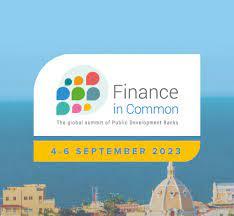
https://rightsindevelopment.org/news/fics-2023-civil-society-insights/
https://rightsindevelopment.org/news/csos-declaration-civil-society-decl...
Our objective is to strengthen partnerships among PDBs to accelerate the convergence towards shared standards and best practices, to support banks’ commitments to shift their strategies towards sustainability, and to give PDBs more visibility in the global fora discussing international policy issues. By mobilizing PDBs and crucial stakeholders, from private sector to civil society organizations, we aim to encourage more coherent approaches to make the whole development finance system consistent with our common climate and sustainability objectives.
For the fourth consecutive year, all Public Development Banks (PDBs) have come together to strengthen their partnership and reinforce their commitments in support of common actions for climate change and sustainable development. This year's edition was co-hosted by the Inter-American Development Bank, CAF, Bancoldex and the Latin American Association of Development Financing Institutions (ALIDE).
Four main themes were adressed: SMEs and financial inclusion, Climate and biodiversity, Sustainable infrastructures, and PDBs' institutional agenda. The Summit also adressed four major cross-cutting issues: social mainstreaming and development impact, private capital mobilization towards SDG goals, collaboration with civil society and incorporation of human rights in strategies and programs, and Latin America and Caribbean perspective.
This month, public development banks from all over the world met in Cartagena, Colombia, for the Finance in Common 2023 Summit with a stated agenda of making development finance more inclusive and more sustainable. We shine a spotlight on critical analyses from civil society Finance in Common participants:
CÉSAR GAMBOA – “FINANCE IN COMMON: UNA ESTRATEGIA SIN RAÍCES FUERTES”
– Link to the full article in Spanish: [Read More]
“At the conference, the optimism of the banks in the fight against climate change and achieving the SDGs was relevant. Yet they do not problematize the challenges at all, and when an opportunity to problematize is offered, what we have is a quick change of subject and never an explanation of ‘how’ challenges will be overcome. Only the opportunities for doing business are stated.”
-César Gamboa, Derecho, Ambiente y Recursos Naturales
STEPHANIE AMOAKO – “FOR PUBLIC DEVELOPMENT BANKS TO EFFECTIVELY ADDRESS THE WORLD’S CRISES, THEY HAVE TO BE ACCOUNTABLE”
– Link to the full article: [Read More]
“There are many ways to better include local communities in the co-design and implementation of publicly financed projects. One minimum obvious step is to have an effective independent accountability mechanism (IAM) that addresses project impacts that threaten to undermine sustainable development and harm people and the environment.”
-Stephanie Amoako, Accountability Counsel
BANKWATCH – “IS THIS DEVELOPMENT? PUBLIC DEVELOPMENT BANKS MUST RETHINK THEIR INVESTMENTS AND PUT LOCAL COMMUNITIES FIRST”
– Link to the full article: [Read More]
“The world’s public development banks will gather for the Finance in Common Summit in Cartagena, Colombia. They’ll be discussing key development issues – from climate change to infrastructure – issues that affect the lives of millions of people around the world. Bankwatch is on the ground to expose the adverse impacts of investments made by development banks and advocates for meaningful community participation in decision-making on development projects. Over recent years, Bankwatch has been monitoring cases of human rights violations and environmental damage connected with projects financed by development banks. Here are some of the worst offenders. You be the judge: Is this really development?”
-Democratisation team, Bankwatch
SOFÍA GARZÓN – “SI GENERA DEUDA NO ES DESARROLLO”
– Link to the full article in Spanish: [Read More]
“I am convinced of what the ancestral, community, and collective authorities contend: that the territory, our lands, are the main guarantors of our rights. It is still urgent to care for, protect and defend the land and all the life that lives on it, which requires us to be alert to false solutions which promote social mobility that makes ten people visible while 10,000 still suffer the violence of hunger.”
-Sofía Garzón, Proceso de Comunidades Negras
MALENA WÅHLIN – “REAL CSO PARTICIPATION STILL MISSING AT FINANCE IN COMMON SUMMIT”
– Link to the full article: [Read More]
“Opening up for civil society is a step in the right direction, but voices from communities affected by development projects deserve more space, and human rights need to be at the core of these discussions. Very few sessions even mentioned human rights risks of development projects except those organized by civil society.”
-Malena Wåhlin, Swedwatch
BIBBI ABRUZZINI – “CHANGING THE WAY DEVELOPMENT IS DONE: A CALL FOR INCLUSION”
– Link to the full article: [Read More]
“The ongoing crises demand a transformation in the quality of financing and a power shift to include the voices of communities. The existing financial architecture not only impedes governments’ ability to safeguard both their citizens and the environment but also contributes to the escalating issue of chronic indebtedness. Policy-based lending and conditionalities enforced by International Financial Institutions have steered countries toward privatization of essential services, reduced social spending, and preferential treatment for the private sector. This burdens the population with higher taxes, inflation, and weakened social safety nets.”
-Bibbi Abruzzini, Forus
The Finance in Common 2023 Summit sparked crucial discussions about the future of development finance. These insightful analyses from civil society participants, members and partners of the Coalition for Human Rights in Development, emphasize the urgent need to reject false solutions and prioritize communities and the environment.
Development for the people, by the people.









